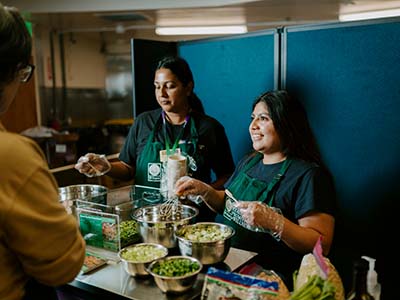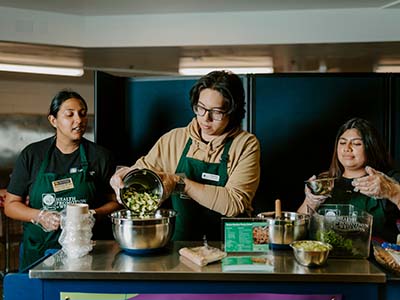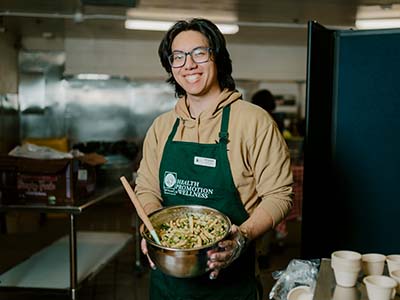Campus food resources help students thrive
Free food, cooking demos, workshops and more help SFSU students avoid food insecurity
When people think about the holiday season, food is on the top of nearly everyone’s mind. Holiday time or not, unfortunately, not everyone has the same access to nutritious food. Throughout the year, San Francisco State University programs like Health Promotion & Wellness (HPW), the Basic Needs Initiative, Associated Students (AS) and more aim to help all students access fundamental needs like food. In fact, there are so many food resources for Gators, HPW Registered Dietitian Nutritionist Anjuman Shah worries that students don’t make use of them as much as they could.
“I think there are a lot of students who aren’t utilizing these resources because they think they’re taking away from other students who might need it more,” said Shah, who meets with students for one-on-one nutrition support. “To those folks, I’m saying that’s really sweet of you to do that. But it’s also OK for you to utilize these resources. College is a difficult time financially and mentally for a lot of people.”
Beyond the resources listed below, HPW has accessible online resources such as nutrition information (how to read labels, budget planning, in-season produce, etc.), a student-produced budget-friendly cookbook and YouTube videos. Students can also schedule a nutrition appointment with Shah to get personalized guidance to fit their dietary needs.
"With rising tuition costs every year, resources like the Associated Students’ Food Pantry/Gator Groceries programs and CalFresh Outreach on campus have been extremely helpful to me in saving money and achieving food security. These programs really help alleviate the stress that comes with inflation," said fourth-year Communications Studies major Eli Samman.
AS Food Pantry and Gator Groceries
Associated Students Gator Groceries and Food Pantry are two weekly programs providing students with free groceries to create nutritious meals. The programs are run in partnership with the San Francisco-Marin Food Bank, which delivers a large truck of food each week. Food distribution is organized to ensure that all food items are available each day, so if an item runs out one day, Shah recommends trying to visit again. The similar names sometimes cause confusion, Shah says. She wants to remind students that Gator Groceries and the Food Pantry are two programs with similar services, which means students have more opportunities to pick up free groceries.
Follow these programs on Instagram for updated information and a preview of what’s available each week.
Key similarities and differences
| Food Pantry | Gator Groceries | |
| Food Pickup Date/Time | Monday: 1 – 5 p.m. Tuesday, Wednesday noon to 5 p.m. |
Thursday, Friday 11 a.m. – 4 p.m. |
| Available food | Mainly fresh produce, some protein, dairy products, maybe some snacks. Students can pick the items they need. | Mainly pantry staples like grains (rice, pasta, quinoa), spices, seasonings, sauces, etc. |
| Location |
Recreation & Dining Level of the Ceasar Chavez Student Center |
|
CalFresh Help Clinic
CalFresh is a program that helps low-income students purchase healthy food. Students approved for the program receive monthly support to purchase healthy groceries. Schedule an appointment with the CalFresh health assistant to learn more and get started on your application. Not only will they help you fill out the application — they can help you assess your eligibility, address any questions and help you navigate the post-application process.
Gator Grub Alerts
Students can opt in to receive Gator Grub Alerts via the SF State Mobile App to be notified of free food on campus. Once staff/faculty post on the app, students get a notification that is valid for 30 minutes. Food is first-come, first-served. Shah says some groups, like one of the dining halls, post an alert every Friday afternoon for any excess food as part of its own sustainability efforts.
“It’s been really successful so far, but we’re hoping to get more students to opt in,” Shah explained. “I think a lot of folks who live on campus opted in for notifications. I think it’d be great to get a lot of students who commute to campus and are just on campus all day to opt in for these notifications.”
Cooking demos and workshops
HPW offers various cooking demos and workshops throughout the semester. Shah and her team often do free demos on Malcolm X Plaza and share free samples and recipe cards. Demos can be for snacks or main meals, ranging from salads to curry to vegan gumbo. Past recipes can be found online. Usually, these demos are designed to utilize the produce available in that week’s AS Food Pantry so students have everything they need to make a nutritious meal immediately. HPW also offers free workshops on everything from meal planning to shopping on a budget to buddy cooking classes. Upcoming events can be found on the HPW events page.



Emergency meal card program
This program is a partnership between FSS and Sodexo to provide free meals at Monarca Dining Hall to University students facing food insecurity. Meal cards provide 10 meals at Monarca Dining Hall. Every semester, Sodexo donates nearly 2,000 meals to FSS. This is an emergency program providing one-time support for students in crisis.
Visit Health Promotion & Wellness and Food+Shelter+Success for information about nutrition and other basic needs resources.